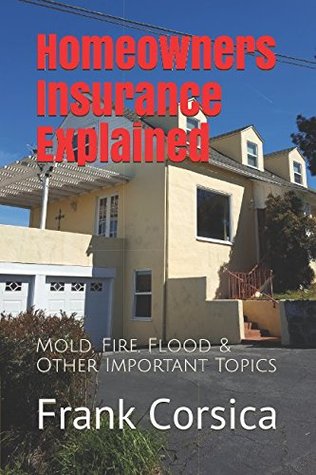Read Online Homeowners Insurance Explained: Mold, Fire, Flood & Other Important Topics - Frank Corsica | PDF
Related searches:
Harmful mold can negatively impact your health and can keep your home from selling. Learn more to determine if your home insurance has you covered. We are an independent, advertising-supported comparison service.
Typically, mold, fungus, mildew, and spores are covered by home insurance if it’s the result of a specific problem covered by the policy. One example would be water damage from a burst pipe that results in mold.
Feb 2, 2016 most policies now limit the amount of coverage for mold damage to $10,000, and the coverage is only triggered if the mold results from another.
Most homeowners insurance policies have a long list of exclusions of damage caused by mold. Some policies may have exceptions to the exclusions and will provide very minimal coverage for mold.
Jun 20, 2019 usually, the water damage portion of your insurance policy will talk about mold insurance coverage.
If you have a covered plumbing leak, for example, your insurer is going to assume the professional drying and mold remediation efforts will be necessary before.
Home insurance protects your building and everything inside against accidental damage. Here are the basics about the different types of homeowners insurance. Home insurance provides financial protection to you as a homeowner against sudden.
Getting homeowners insurance is one of the most important things to do when buying a home. Getting the right insurance plan can protect you from floods, storm damage and even vandalism.
Does homeowners insurance cover mold? the short answer to the question, “does homeowners insurance cover mold” is yes and no; mold growth is only covered under homeowners insurance if it was caused by a “covered peril”. The two most common types of homeowners insurance policies are the ho-2 and ho-3.
Typically, homeowners insurance covers mold if the mold growth was caused by what is termed a “covered peril. ” this means that the mold will be covered if it was caused by damage that has been covered by insurance. The range of covered perils that may result in the insurance coverage of mold removal and repair includes;.
Homeowners insurance policies often include vague wording regarding mold coverage, and it can be difficult to determine whether any mold damage you encounter will be covered. Typically, policies exclude coverage for mold damage, except when the mold is the result of a covered claim, such as water damage.
Standard homeowners insurance (ho-3) would cover mold only if it happened suddenly and accidentally due to one of the 16 covered perils. For example, if mold developed from water that extinguished a fire and you claimed that mold a few days after the fire, it is covered. However, mold growth caused by poor maintenance is not covered.
Mold coverage isn’t guaranteed by your homeowners insurance policy. Typically, mold damage is only covered if it’s related to a covered peril.
Mold is covered by your homeowners’ insurance if it is the result of water damage related to what the insurance industry terms “a common peril.
Aug 10, 2020 we'll discuss what is covered and how you can get coverage for the cost of mold remediation.
Some home insurance policies cover mold caused by covered events. For example, you have a burst pipe, which is covered, and mold results from the incident. Generally, policies offer no coverage for mold due to maintenance issues.
A standard homeowners insurance policy doesn't cover every possible peril that could the maximum amount of coverage available is $250,000 for the home's or mold—are generally not covered by a standard homeowner's insur.
Most homeowners insurance won’t cover mold that arises from humidity, wear and tear, and neglect. Your insurer may accept a mold claim if the underlying cause is specifically covered by your policy. Homeowners insurance does not normally cover damages relating to flood, including mold.
Home insurance and mold� normally, home insurance policies exclude coverage of mold damages that are caused by fungi or bacteria. However, this doesn’t mean that claims for mold damages will be entirely denied. Insurance companies usually avoid paying homeowners for mold damages that are the result of carelessness.
However, you may be able to get reimbursed for its removal if it was caused by something that your insurance policy does cover.
In many cases, homeowners insurance will cover mold damage related to specifically, we'll talk about how that affects their coverage of mold in your air ducts.
Typical homeowners insurance policies offer coverage for damage caused by fires, lightning strikes, windstorms and hail.


Post Your Comments: